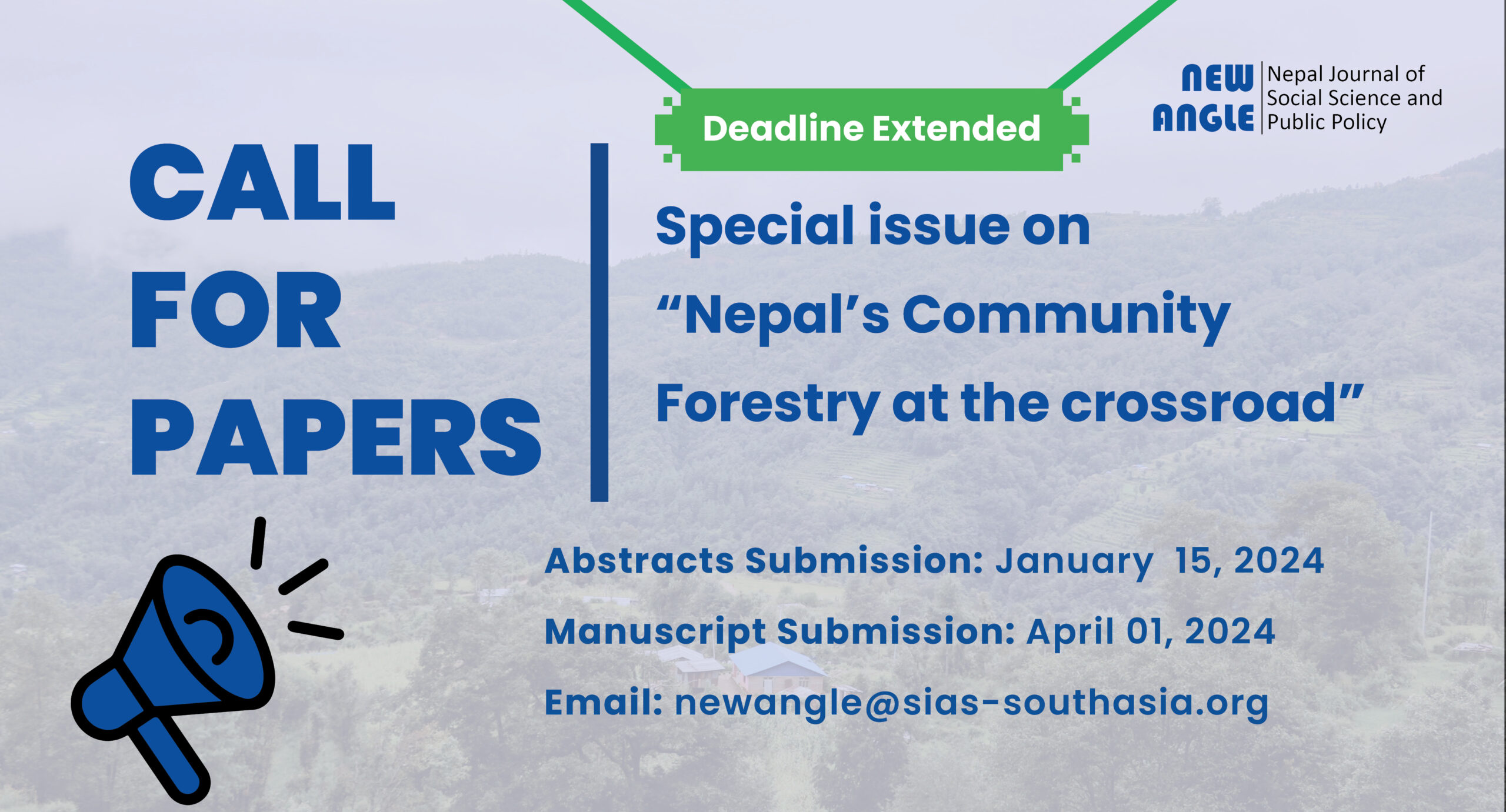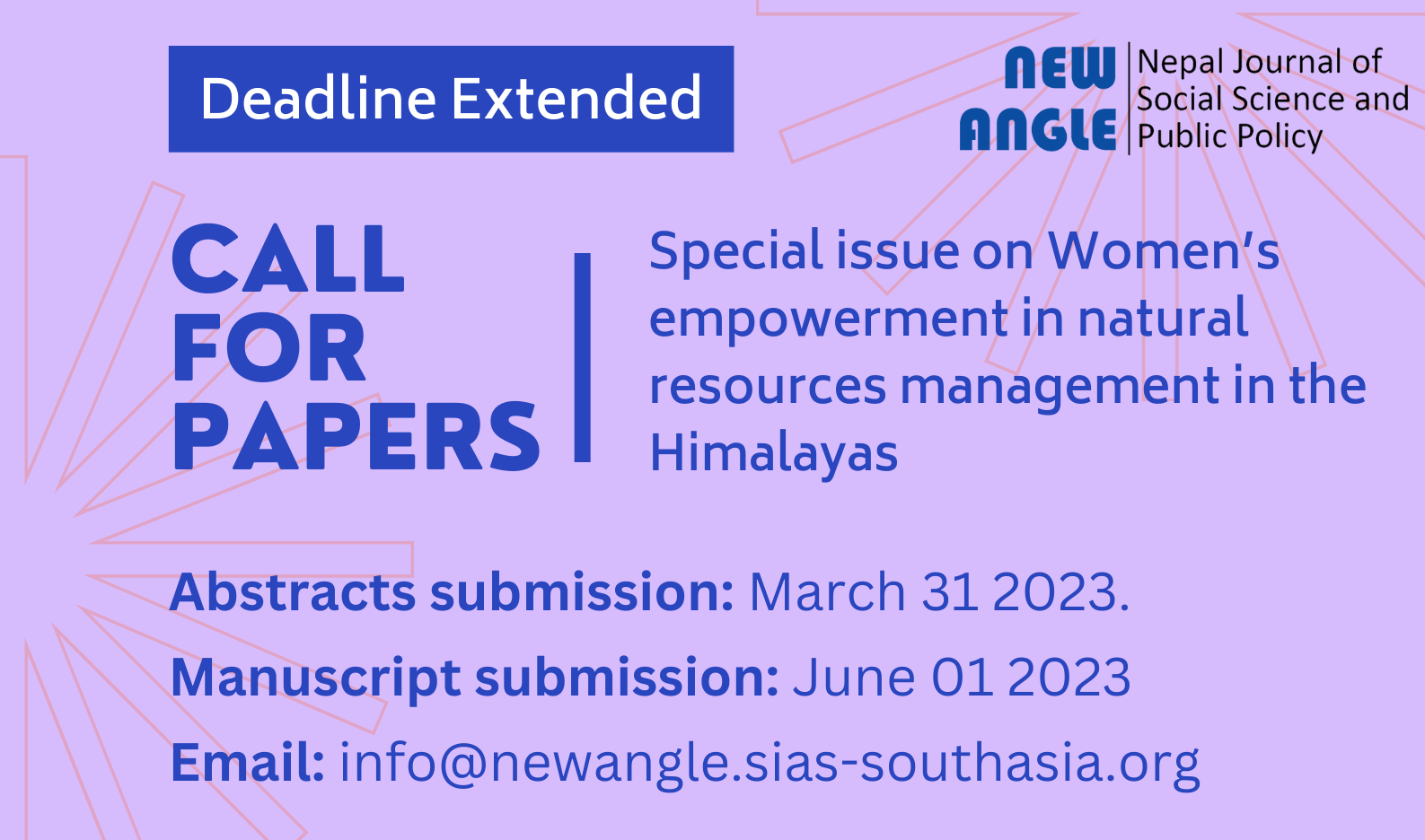Call for papers
New Angle: Nepal journal of social science and public policy
Chief Editor : Dr. Dil B. Khatri
Editors : Dr. Dilli Prasad Poudel , Dr. Anushiya Shrestha
Guest editor : Dr. Jonathan Ensor University of York, United Kingdom
Managing editor: Gyanu Maskey
Special issue on Urbanisation and Disaster Risks in the Himalaya
The Himalaya region, having an active geology and dynamic geography, frequently experiences hazards of high magnitudes and intensities such as flood, landslide, earthquake, fire, avalanche, storm and epidemic, as well as everyday accidents. These events kill hundreds of people and damage property and resources every year, undermining the development of the region. Rapid urban population growth in the region has led to increasingly dense urban settlements, and the risk of disasters in these settings demands urgent attention. In many contexts, urban governance initiatives are prioritising improved resilience to potential disasters, devising plans and policies and undertaking infrastructure and development activities (led by both governmental and non-governmental organisations). However, not all urban dwellers have received equal attention, leaving some more vulnerable than others. Given the nature of Himalayan people’s exposure to multi-hazard risks, understanding diverse experiences and perceptions of risks, root causes of risks (bio-physical, and socio-technical and political-institutional), and the underlying narratives that inform differential responses and abilities to deal with and reduce such risks are crucial. Such scrutiny can help in enhancing the risk management abilities and resilience of marginalised dwellers and their representatives, setting the ground for more equitable and resilient cities. Furthermore, such nuanced interpretations help to expose how risk management institutions and actors interact, and how urban governance assemblages explicitly or implicitly prioritise development activities in multi-hazards contexts. Exploring local risks, urban dwellers’ needs, narratives, institutions, and practices will, therefore, not only be an instrument to make local communities aware of the future risk of hazards and disasters but also indicate policy solutions for future planning to mitigate and prepare for them.
For example, the urban areas and populations in Nepal are rapidly explanding primarily due to rural-urban migration and the conversion of seemingly rural areas into municipalities. Urban governance, particularly in the newly declared urban areas (e.g., ‘smart cities’ of Kathmandu), frequently lack institutional capacity, infrastructure and knowledge for disaster preparedness, exposing ‘new urban’ residents to multi-hazard risks. Additionally, the exposure to multi-hazard risk and effects of disasters on residents vary along the lines of formal to informal settlements, class, caste/ethnicity, gender, and ability and access to local political economy. Understanding disaster risk and urban social vulnerability and resilience can, therefore, be a pragmatic entry point to foresee tomorrow’s safer city.
Against this backdrop, Southasia Institute of Advanced Studies (SIAS) is pleased to call for papers for a special issue of the New Angle: Nepal Journal of Social Science and Public Policy entitled, “Urbanisation and Disaster Risks in the Himalaya”. We welcome researchers, academicians, professionals, national and international organisations, and graduate students from Nepal and other Himalayan countries to submit their research articles in this special issue. The knowledge generated from this publication will help improve awareness of potential risks and risk reduction strategies, contribute to enhancing knowledge on disaster governance, and help city and national governments to better understand and undertake necessary steps to plan for and reduce the risk of present and future cities.
We are looking for original research and review papers on one or more of the following themes
- Understanding Risk: Types of urban risks and how they are framed in narratives of risk that exist among urban dwellers, stakeholders, networks of actors, and how these framings relate to stakeholders’ and actors’ interests and interactions
- Understanding Disaster Risk governance: Structures of urban disaster risk reduction (DRR) governance, including roles & responsibilities, forms of authority, and interactions among and between formal and informal DRR actors and institutions, and the effects on vulnerability and resilience among different groups.
- Understanding Resilience: Narratives of resilience that exist among local to national stakeholders and institutions, their relative influence, and how they are informed and reproduced over time. Everyday lived experiences of resilience, post-disaster community coping/adaptation strategies and mechanisms.
- Political Capabilities: How urban social structures (e.g., caste/ethnicity, gender, class such as formal/informal settlements, house owners/tenants) and their corresponding risks, vulnerabilities, resilience, planning capacities, and access to scalar political economy, connect to political capabilities (i.e., ability to determine risk reduction and development trajectories through access to and influence over local institutions, politics, infrastructures, markets).
- Recovery and Disaster: Post 2015 earthquake recovery and rehabilitation endeavors, effect and response to yearly flooding, extreme rainfall, landslides, and inundation both in urban centers and peri-urban spaces.
- Policy and Planning: Policy, planning and governance initiatives for tomorrow’s cities, including risk reduction, disaster response, development-disaster risk trade-offs and the role of technology innovations in disaster management.
Deadline for submission: The deadline for abstract submission has been extended to 15th March 2020 and full paper by 31st July 2020 to editors in following email address:
Gyanu Maskey (Email: gyanu@sias-southasia.org and maskeygyanu@gmail.com).




